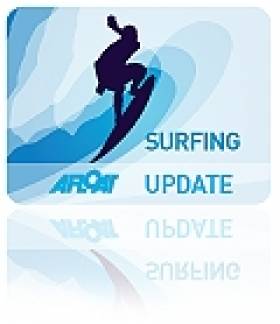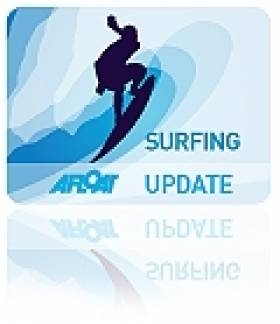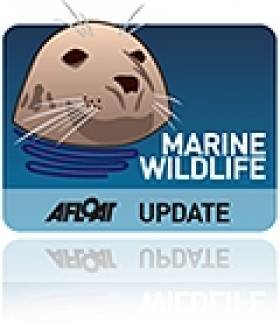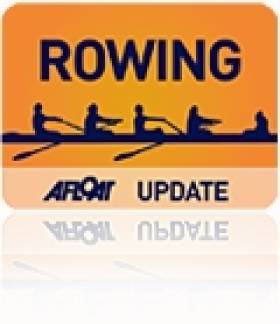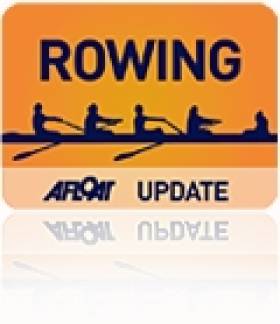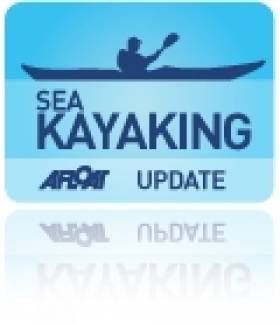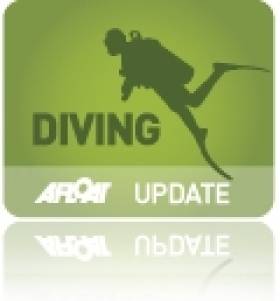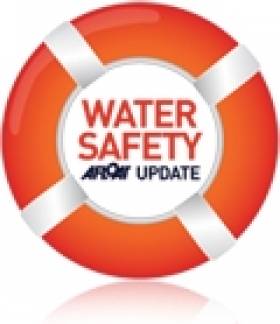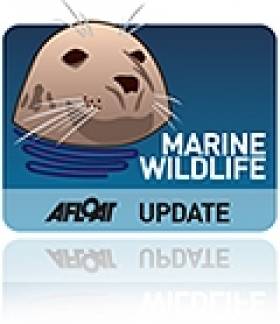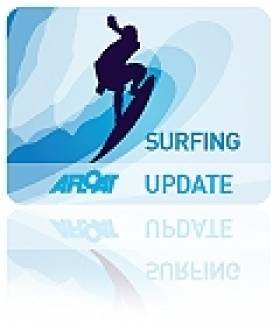Displaying items by tag: Australia
#Surfing - The family of an Irish surfer in Australia who went missing after he and two friends were pulled out to sea by a rip current have expressed their hope that he will be returned to them.
As previously reported on Afloat.ie, the incident prompted a major search and rescue effort in treacherous conditions off Tallow Beach on Byron Bay, south of the Gold Coast in New South Wales last Saturday morning (19 July).
The missing man has since been named by Independent.ie as 20-year-old Stuart Butler from Santry, who had joined two friends, Levi Fahrenholtz (25) from the US and Mike Fuller (19) from England to go boarding at the popular surfing spot.
Fuller managed to reach nearby rocks when the rip current pulled them away from the beach, and Fahrenholz was later rescued after he was swept around Cape Byron, but all trace of Butler's whereabouts was lost.
The North Dubliner is officially listed as a missing person, though it's been confirmed that the search effort is "now a body recovery operation".
Independent.ie has more on the story HERE.
Irish Surfer Missing Off Eastern Australian Coast
#Surfing - The Irish Times reports that the search for an Irish surfer missing since Saturday morning (19 July) off Cape Byron in Australia was suspended earlier today in fading light and treacherous conditions.
The 19-year-old was surfing with two friends when they got caught in a rip current near Tallow Beach, south of the Gold Coast in New South Wales.
One of the two rescued, aged 26, was helped from the water unharmed, while the other, aged 20, was found on nearby rocks with minor injuries.
Local surf clubs have joined in the search and rescue operation attended by helicopters and jet ski crews. The Irish Times has more on the story HERE.
Sydney Surfers Get Too Close To Large Whale For Comfort
#MarineWildlife - Surfers in Sydney's Freshwater Bay have been accused of harassing a large whale that came close to the shore at the weekend.
The southern right whale, believed to be a female searching for a quiet place to calf, caused amazement when she swam into waters populated by surfers and swimmers near Australia's largest city.
But as the UK's Independent reports, such giant marine wildlife poses a serious danger to humans, with a surfer reportedly injured by a whale of the same species at Bondi Beach last year.
That didn't stop one group of surfing enthusiasts from paddling close to the whale, ignoring warnings over loudspeaker from the beach nearby.
“To be honest they were harassing it a bit," said local resident Ian Hansen. "They were so close and it had no room to move."
As ITV News adds, Australian law requires swimmers to stay at least 30 metres away from whales in the water, while boats and surfers must keep 100 metres' distance.
Coakley Takes Silver Medal at World Cup in Sydney
#ROWING: Skibbereen man Richard Coakley took a silver medal at the World Cup Regatta in Sydney Australia. The 30-year-old, competing for the first time in a regatta for Australia, had to give way to the faster Wang Tiexin of China in the A Final of the lightweight single sculls. The two fought it out at the head of the race, but Wang had too much for Coakley and moved clear in the final 500 metres.
Coakley won a World Cup medal for Ireland in the lightweight eight in 2005. He rowed for Ireland at the Olympic Games in 2008, coming in as a reserve for Gearóid Towey in the lightweight four in the B Final in Beijing. He moved to Australia in 2010.
World Cup Regatta, Sydney, Australia (Irish interest)
Men
Lightweight Single Scull – A Final: 1 China (Tiexin Wang) 7:05.54, 2 Australia One (R Coakley) 7:13.54, 3 Australia Two (J Harrison) 7:20.87; 4 Vietnam 7:22.75, 5 Hong Kong Two 7:33.45, 6 Vanuatu 7:54.72.
Lambe Pulls Out of World Cup Rowing Regatta
#ROWING: Ireland will be without an entry at the World Cup regatta in Sydney this weekend. Claire Lambe, who was entered in the lightweight single sculls, has pulled out because of injury. The Dubliner has hamstring tendinitis. She has been competing with some success for Melbourne University Boat Club but plans to return home to Ireland as planned in the next two weeks.
Derry-Born Surf Kayak World Champ Gets Congrats From Home
#Kayaking - Derry Mayor Martin Reilly offered his congratulations to native son Jake King on taking the surf kayak world title in Australia earlier this month.
As the Derry Journal reports, 18-year-old King was crowned champion after topping three other reigning top dogs in the men's longboat, masters and junior short boat in the final of the competition at Maroochydore beach in Queensland.
According to his father Paddy, Jake King can now add his name to the list of five previous world champions from the Canoe Association of Northern Ireland (CANI) surf kayak club - which includes his brother Corin.
In other kayaking news, a London paddler has broken the record for circumnavigating the Isle of Man in the Irish Sea.
BBC News reports on the feat achieved by 39-year-old George Shaw, who completed the 115km route around the island in 11 hours 43 minutes - smashing the previous record by almost an hour.
Irishman Drowns While Diving Off Thailand
#Diving - The Irish Times reports that an Irishman has died in a diving accident in Thailand.
Twenty-nine-year-old Colin Callanan from Cork drowned off the island of Koh Tao off the east coast of the South East Asian country on Friday 12 April.
The exact circumstances surrounding his death have not yet been announced.
Callanan was diving in his spare time while on a work trip to the country. He had been based in Perth, Australia for the last six years, and was employed by an air conditioning firm since 2010.
The Irish Times has more on the story HERE.
Crushing Incidents Restate Need for Safety Around Moored Vessels
#Safety - Two recent crushing accidents in the UK and Australia have restated the need for vigilance at the waterside even when boats are moored.
Yachting & Boating World reported last month on a port worker at Denton Wharf in Gravesend who was rendered critically ill after being crushed against a pier by a 40-tonne barge.
Thirty-six-year-old Michael Russell, a 20-year veteran of the wharf, was mooring the boat when the accident occurred. His wife Natalie said he "was in the wrong place at the wrong time."
Elsewhere, Australia's 9 News reports that the body of a man in his late 20s or early 30s was recovered from the water in Sydney Harbour after falling overboard from a luxury yacht and being crushed against a mooring pillar.
Both incidents should serve as a reminder all those on or near boats moored at port or dockside to maintain the same safety standards they would while on the water.
Man Saves Children from Shark Attack
#MarineWildlife - The video below from the Guardian captures the moment when a brave Welsh tourist wrestled a shark away from a beach crowded with children in Australia.
As BBC News reports, 62-year-old Paul Marshallsea took charge of the situation by grabbing the two-metre-long dusky shark by the tail and dragging it away from the shallows at the beach on Queensland's Sunshine Coast - narrowly missing being bitten in the process.
"My instincts took over and I just grabbed the shark by the tail," said Marshallsea, who added that the ocean predator "nearly took my leg off in a split second - it was that quick."
Though few attacks by dusky sharks have been recorded, the species is regarded as "potentially dangerous" to humans due to their large size.
Irish 'Happy to Be a Part' of First SUP and Paddleboard Worlds
#SURFING - Team Australia proved that when it comes to watersports, they're a step above most of the competition at the inaugural ISA World Stand-Up Paddle (SUP) and Paddleboard Championships in Lima, Peru recently.
The paddleboarding duo of Brad Gaul and Jordan Mercer each won three gold medals, along with the team gold medal and the perpetual Club Waikiki Trophy, which will be awarded to the overall team champion every year.
But for every powerhouse team like Australia, the USA and South Africa, there were teams like Ireland who arrived at the world championships to represent themselves well, but also to be able to say they were there for the beginning of something big.
"The event was just amazing, such a positive vibe amongst all the competitors, everybody that we met from local organizers to everyone at our hotel or the drivers," said Finn Mullen, who competed along with teammates Dave Owens, Paul Byrne, Ed O'Farrell, Keith Gorman and Jane Downes.
"They were all so stoked to have the contest and see us all here," Mullen added "and there was like this amazingly friendly vibe in the water, because really they were being super gracious to us, giving us the break for the entire week, and they couldn't be more accommodating and I couldn't me more happy that I was able to be a part of it."


























